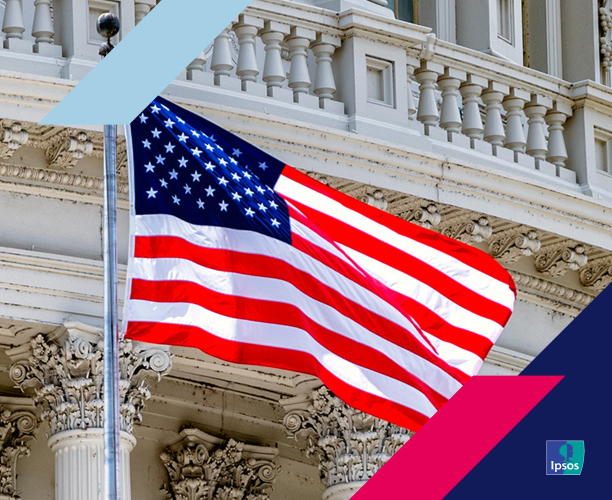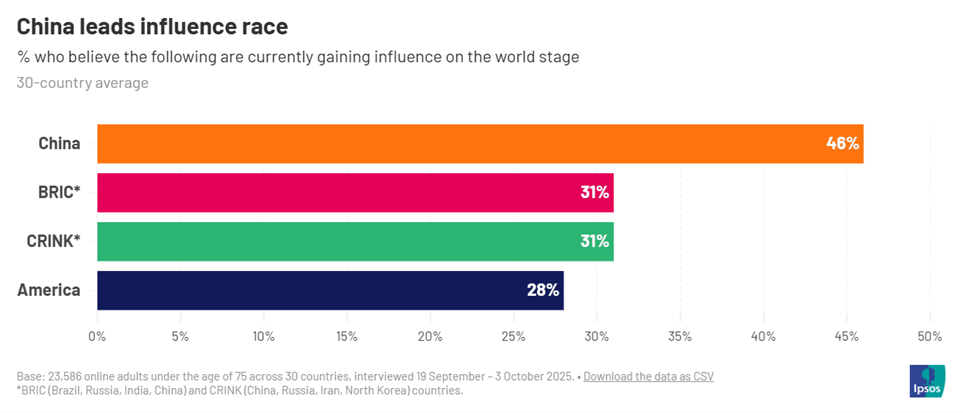

America’s Global Reputation Takes a Tumble Amid Trump 2.0 Era
Is U.S. President Donald Trump making America great again?
Not in the opinion of some around the globe these days.
New polling of more than 23,000 people across 30 countries by Ipsos for the Halifax Security Forum finds just under half, 48% on average across 30 countries, believe the U.S. will have an overall positive influence on world affairs over the next decade.
The polling via Ipsos’ Global Advisor online platform between Sept. 19 – Oct. 3, 2025, finds that’s down 12 percentage points from our polling last year, which was done right before Trump won the election.
The proportion who think the U.S. will have a positive impact fell in 29 of 30 countries in 2025 and didn’t budge in Türkiye (40%, no change year-over-year). And even Americans are now less likely to think the U.S. will have a positive impact (68%, -9 percentage points).
Backs (and elbows) up
Amid Trump’s ‘America First’ agenda it’s perhaps little surprise that people in countries hit by the president’s so-called ‘Liberation Day’ tariff plans have their backs up.
And given the annexation and tariff threats Trump has thrown at Canada over the past year it’s really no surprise the Canadians have their backs … and elbows up.
America’s northern neighbors are now the least likely of all 30 countries to think the U.S. will have a positive impact with just 24% of Canadian saying so, down a whopping 28 points compared to 2024.
The broken state of the relationship between the once friendly nations is striking.
Canadians are the least likely to agree “U.S. President Donald Trump’s approach to world affairs has made the world a safer place today” of all 30 countries, with just 15% saying so versus the 39% of Americans who think this and the 29% global average.
Canadians are the second least likely country (tying with Belgium at 18%), right behind Germany at 17%, to think U.S. President Donald Trump is a peacemaker, vs. 36% of Americans and the 26% global average. Though it’s key to note mid-way through this polling Trump and his administration helped to broker the Gaza peace plan. The American president has also tried repeatedly to bring an end to the Ukraine war since taking office on Jan. 20, 2025.
And while America has long attracted the best and brightest from around the world only one in three (34% on average globally) currently say they’d be willing to move to the U.S. if given the opportunity, with those in Canada (21%) among the least likely to say so.
Trump slump redux
The last time Trump won the keys to the White House in November 2016 America’s reputation on the world stage took a dive, with the proportion of people who thought the U.S. would have a positive influence sliding 11 points in 2017 to 55%, on average across 20 countries*, and then hovered around the 50-percent mark throughout Trump’s first term.
The global proportion who thought the U.S. would have a positive influence then jumped back up in 2021 (+13 points to 63%) after now-former U.S. President Joe Biden was elected. But after hitting 64% in 2022 there was a gradual downward slide as Biden wrapped up his one-term presidency falling to 59% in 2024.
And the proportion of people who agree “when it comes to achieving positive outcomes in the world, the United States continues to be the most reliable leader for democratic nations” dropped in 29 out of 30 countries to 51% (-seven pts on average globally) in 2024 under Biden’s watch. That has now slid a further nine points to 42% amid Trump’s second, non-consecutive, term. The Canadians are now the least likely of all countries to think this (23%, -19 pts) while just over half of Americans (52%, -10pts) think their country is the most reliable leader for democratic countries in 2025.
The proportion agreeing that the U.S. and its allies, including the North Atlantic Treaty Organization (NATO), make the world more secure stayed relatively stable falling four points to 51% year-over-year. Just under half (49%, -seven pts) Canadians now think this, compared to almost two-thirds (64%, -two pts) of Americans.
China, BRIC and CRINK countries gaining in influence
Amid America’s reputational slide China, along with BRIC and CRINK countries**, are seen to be on the rise.
A new question this year finds almost half (46%) think China is gaining influence on the world stage, followed by BRIC and CRINK countries** (tying at 31%) and America (28%). At the same time, the U.S. is seen as the most likely country to be losing global influence (32%).
https://public.flourish.studio/visualisation/26144616/

Meanwhile, almost one five (18% on average across 30 countries) think the U.S. poses the greatest security threat to their country, that’s same proportion who say the same about Russia (18%). And America is neck-and-neck with China when it comes to trust with 37% (on average across 30 countries) saying China can be trusted, followed very closely by the U.S. (36%) with Russia following behind at 27%.
People in Canada tie those in Sweden (22%) as the countries least likely to say the U.S. can be trusted, compared to 53% of Americans who think their country can be trusted and the 36% global average.
But, many seem to believe America’s stumbles are just a blip.
Almost three in five (58% on average across 30 countries and a majority in 26) think when Trump’s term is over the U.S. will go back to its more traditional role on the global stage.
Support for free trade stable amid trade war
Amid Trump’s ongoing global tariff war support for free trade stayed steady year-over-year (69%) after falling 10 points to 70% in 2024.
In 2025, Singaporeans (80%, +five pts) are the most likely to agree that free trade is beneficial for their country’s economy while those in France (52%, +three pts) are the least likely to agree. A similar proportion of Canadians (70%, +10 pts) and Americans (69%, no change) now think this.
A new question this year finds almost three in five (58% on average across 30 countries) agree that using tariffs is an effective way for their government to stand up for their country’s economic interests. Malaysians (77%) are most likely to agree with this and Italians are least likely (42%).
Canadian Prime Minister Mark Carney, elected earlier this year, has yet to get a tariff deal with the U.S. as tensions between the two long-time trading partners remains high. Half (50%) of Canadians think using tariffs is an effective way for their government to stand up for their country’s economic interests vs. 46% of Americans.
*Change for 20-country average is based on the countries which were in all editions of the Ipsos for the Halifax Security Forum report over the past decade.
**BRIC (Brazil, Russia, India, China) and CRINK (China, Russia, Iran, North Korea) countries.
About the Study
These are the results of a 30-country survey conducted by Ipsos on its Global Advisor online platform and, in India, on its IndiaBus platform, between Friday, September 19, and Friday, October 3, 2025. For this survey, Ipsos interviewed a total of 23,586 adults aged 18 years and older in India, 18-74 in Canada, Republic of Ireland, Malaysia, New Zealand, South Africa, Türkiye, and the United States, 20-74 in Thailand, 21-74 in Indonesia and Singapore, and 16-74 in all other countries.
The sample consists of approximately 2,000 individuals in Japan, 1,000 individuals each in Australia, Belgium, Brazil, Canada, France, Germany, Great Britain, Italy, New Zealand, Spain, and the U.S., and 500 individuals each in Argentina, Chile, Colombia, Hungary, Indonesia, Ireland, Malaysia, Mexico, the Netherlands, Peru, Poland, Singapore, South Africa, South Korea, Sweden, Thailand, and Türkiye. The sample in India consists of approximately 2,200 individuals, of whom approximately 1,800 were interviewed face-to-face and 400 were interviewed online.
Samples in Argentina, Australia, Belgium, Canada, France, Germany, Great Britain, Hungary, Italy, Japan, the Netherlands, New Zealand, Poland, South Korea, Spain, Sweden, and the U.S. can be considered representative of their general adult populations under the age of 75. Samples in Brazil, Chile, Colombia, Indonesia, Ireland, Malaysia, Mexico, Peru, Singapore, South Africa, Thailand, and Türkiye are more urban, more educated, and/or more affluent than the general population. The survey results for these countries should be viewed as reflecting the views of the more “connected” segment of their population.
India’s sample represents a large subset of its urban population — social economic classes A, B and C in metros and tier 1-3 town classes across all four zones.
The data is weighted so that the composition of each country’s sample best reflects the demographic profile of the adult population according to the most recent census data. “The Global Country Average” reflects the average result for all the countries and markets in which the survey was conducted. It has not been adjusted to the population size of each country or market and is not intended to suggest a total result.
When percentages do not sum up to 100 or the ‘difference’ appears to be +/-1 percentage point more/less than the actual result, this may be due to rounding, multiple responses, or the exclusion of “don't know” or not stated responses.
The precision of Ipsos online polls is calculated using a credibility interval with a poll where N=1,000 being accurate to +/- 3.5 percentage points and of where N=500 being accurate to +/- 5.0 percentage points. For more information on Ipsos' use of credibility intervals, please visit the Ipsos website.
The publication of these findings abides by local rules and regulations.




